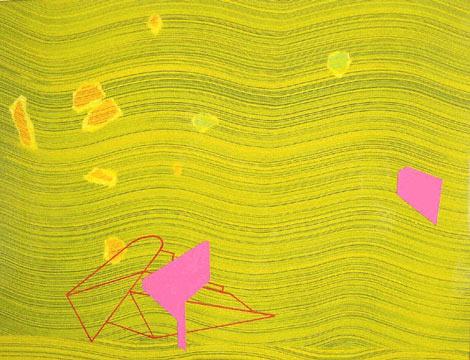Roland Reiss
dal 4/4/2003 al 10/5/2003
Segnalato da
4/4/2003
Roland Reiss
DoubleVision Gallery, Los Angeles
Color (and the transparency of color) and form stand out as primary references in these new works by Roland Reiss. New Landscape/Mylar Hybrids explores new territory in painting by an artist who has incessantly confronted the manifold possibilities of seeing, throughout a long and distinguished career as a practitioner and teacher.

'New Landscape/Mylar Hybrids'
new works
Roland Reiss at DoubleVision Gallery
by Margarita Nieto
'Explaining colour words by pointing to coloured pieces of paper does not
touch the concept of transparency. It is this concept that stands in unlike
relations to the various colour concepts.'
--Ludwig Wittgenstein, Remarks on Colour
'Painting has two weapons at her disposal: 1. Colour. 2. Form.'
--Wassily Kandinsky,
Concerning the Spiritual in Art
Color (and the transparency of color) and form stand out as primary
references in these new works by Roland Reiss. New Landscape/Mylar Hybrids
explores new territory in painting by an artist who has incessantly
confronted the manifold possibilities of seeing, throughout a long and
distinguished career as a practitioner and teacher.
The borders and limits of two-dimensional art resulted in Reiss turning to
sculpture in 1969-70 and to a series of miniatures--three-dimensional
figurative worlds encased in plexiglas boxes. These worlds, these
illusionistic and representational 'territories of life' initiated the
process leading to the present works in that the artist began to confront
the concept of representation. Eventually, in 1991, he turned again to
painting and to the non-objective and the abstract, specifically to
interrogate the space where the mind no longer creates a connection between
the description and the object. The result was a series of paintings in
which Reiss trowelled acrylic paint through thick stencils, leaving
low-relief shapes on the canvas.
Two incidents however changed the course of the work. Reiss had began to
notice the surface of the pieces of mylar he used to mix paint and the
'accidental' mixture of colors and surfaces that remained on them. Almost
simultaneously, he was drawn to real estate advertisements, miniscule
landscapes of houses surrounded by trees, bushes, lawns and sky. The result
was New Landscape/Mylar Hybrids.
New Landscape involves exploring the abyss between the image that emerges
from the descriptive, and the image conceived without a prior reference. The
making of the paintings is, in itself, a conscious search for that space and
the mylar sheet is the materia prima. Painted with acrylic on both sides,
the mylar is the physical space on which the elements of these paintings
come together.
The act of painting the mylar is at times gestural, at other times
controlled with geometric optical effects. The layering itself consists of
placing inclusions under the metallic surface or on top of it. Initially,
this process is purely and consciously non-objective. There is no
descriptive reference point, with color and form serving as the sole the
determinants. Common to all is a linear geometrical shape that signals an
architectural association.
Color values are determined by underlying surfaces, whole sheets or units of
color which heighten form even as the shimmering mylar effects a floating
sensation. The palette itself ranges from black and white to soft then
deeper pinks, then to lime greens and yellows, oranges, teals and deep
blues.
The point of demarcation from the non-objective genesis of these images to
their becoming charged with descriptive meaning and context comes about
through their titles: Remax/Ocotillo, Remax/Encantada, or Remax/Skyview.
These titles conceptualize the meaning of 'landscape' through associations
that the viewer has with the word-sign 'Remax': 'real estate,' 'house,'
'home,' 'place,' 'living space;' all experiential signifiers of comfort and
security. That feeling is intensified through the layers of mylar, colored
sheets and inclusions which imbue distance and perspective to the images.
Through word-sign and distance, the viewer is invited to 'see' clouds,
trees, sky and buildings in these works.
In Remax/ Ocatillo, for example, broad, white, horizontal brushstrokes
against black set off a precise black line drawing, enlivened in turn by
small green floating shapes and a lighter, lime green circular swirl. Below,
dots and traces of black emerge among cloud-like white blots and a pale pink
haze disappears into the bottom edge of the painting.
In Remax/Encantada warm sunny blobs and progressions of oranges, yellows and
greens of varying intensity shimmer through the mylar, a homage perhaps to
the golden verdant California landscape. In Remax/Miraleste that sunniness
is tempered by a black underlay which simultaneously enlivens the yellows
and yellowish-greens, and the architectural reference which stands out in
pink and red. But it is the transparent filmy glow and softness of the mylar
that defines these works. Not surprisingly, that glow and tactile softness
does not reproduce well in photographs or slides.
Turning from writing this piece, my eye catches today's real estate ads, and
I am struck again at how we cling to a view of a 'world as it is.' How
jolting and refreshing it is to grasp how Reiss opens up new territories,
new landscapes for our eye.
Image: Roland Reiss, "Remax/Miraleste," 2003, acrylic and mylar, 19 x 24".
Roland Reiss has exhibited extensively in the United States and abroad. His
work has been seen at the Whitney Museum of American Art and at Documenta in
Kassel, Germany. Exhibitions include museums in Brazil, Mexico, Canada,
Japan and Taiwan. He is the recipient of four N.E.A. grants and of more than
forty prizes and awards. His work is located in many public, corporate and
private collections. Known also as a sculptor, Reiss has concentrated
exclusively on painting since 1992.
gallery hours: tues. - sat., 11 - 5 pm
reception: Saturday, April 5th, 5 to 8 pm
DoubleVision Gallery - Los Angeles
5820 Wilshire Boulevard #100
Los Angeles, California 90036
tel: 323.936.1553



